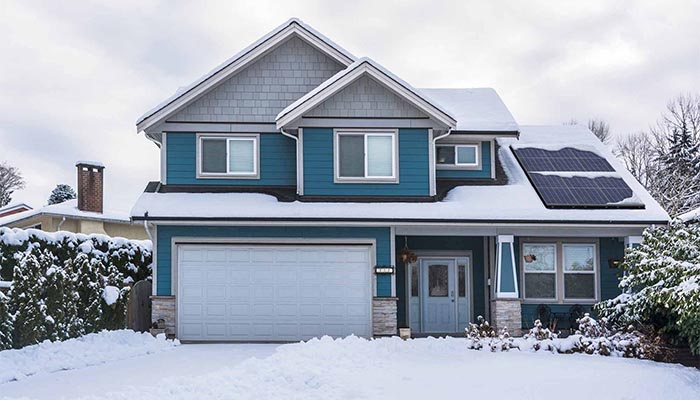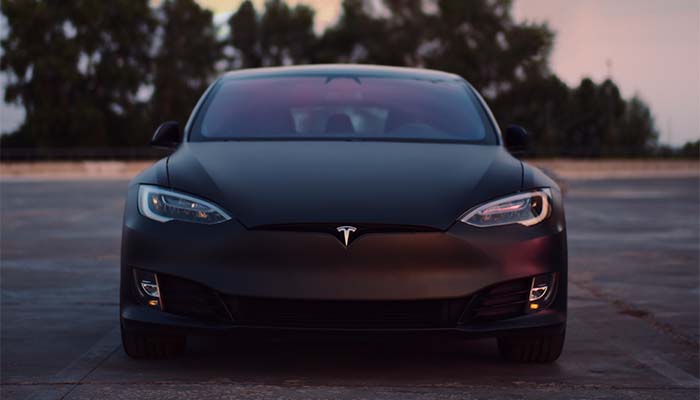
Updated December 5, 2021
Yes, they do! Whether you live in Sunny Florida or a snowy state like Colorado, you can still reap all the benefits of solar energy. Houses with solar energy save hundreds of dollars on electricity every month, help the environment, and can even earn tax credits or rebates—don’t let cold weather stop you from taking advantage of these benefits!
How Do Solar Panels Work in the Winter?
Understanding how solar panels can work in the winter first starts with understanding the basics of solar energy. According to the Department of Energy, when sunlight hits a PV solar panel, its PV cells absorb the sun’s solar energy. This energy then creates electrical charges that move to the edge of the solar panel, producing electricity. How is this process affected by the cold winter months? Simply put, it’s not. The panels convert the sun’s energy into electricity, not the sun’s thermal power.
This common misconception about solar panels in cold weather most likely started due to the winter’s shorter days and from heavy snowfall sitting on panels. As long as there is sunlight hitting the solar panels, the cold weather has little to no negative effect on their efficiency.
Surprisingly, solar panels work better in the winter, since they’re working more efficiently. Electrons in cooler temperatures are at rest, or low energy, when the sun hits these electrons, it causes them to shoot right back up to their high energy state. The wide difference from low energy to high energy is the potential voltage people can get from their panels.
In short, the bigger the difference in energy, the more electricity your solar panels can create (scienceline). Therefore, solar panels are more efficient during the winter months since the electrons are at rest more often.
Do Solar Panels Work When it Snows?
This is a more complicated question, where yes and no are both adequate answers. Technically, if a thick layer of snow covers every inch of all solar panels on a roof, then no, solar panels can’t capture the sun’s energy. Luckily, this rarely—if ever—happens thanks to the way solar panels are installed at an angle. This makes it easier for snow to fall off just as quickly as it meets the panel. Some solar panels even allow you to change the steepness of the angle throughout the year, changing it to a steeper angle during the Winter.
It’s also important to note that solar panels are constantly trapping the sun’s energy, causing them to be warmer than the outside climate. This will cause the snow to melt faster than normal when caught on a solar panel. When the snow melts and falls off the solar panel it has the added benefit of washing away any dirt, saving you a dangerous trip to the roof to clean your panels. Finally, snow is reflective, allowing for solar panels to get more energy from the sun.
Do Solar Panels Work When it Rains?
According to the Solar Energy Industries Association, solar panels can still create energy when it’s rainy and clouds are partially blocking the sun. If the sun is even slightly out, solar panels can capture that energy. While a cloudy day may not produce as much energy as a cloudless, sunny day, there’s still no need to worry. The energy that was collected in sunny hours of the day that went unused will be stored for use during times when your solar panels aren’t collecting energy at full capacity. Going solar means never having to worry about not having enough energy.
Just like snow can benefit your panels by wiping away any dirt or mud, rain has the same effect. According to Greener Choices, the accumulation of dirt or dust can decrease your solar panel’s efficiency by around 5%. Therefore, People who own solar homes or businesses shouldn’t dread any precipitation since it’s helping panels run more efficiently.
Should I Remove the Snow off My Solar Panels?
Some people don’t like waiting for gravity and heat to naturally do their thing and decide to take matters into their own hands. One of the most common and riskiest methods of snow removal is by climbing up on a ladder and pushing the snow off with a wide brush. Another method of removal is spraying the snow with water from a hose. This method is less risky, but you run the chance of the water freezing over the solar panels.
Ultimately, removing snow from solar panels yourself is not worth the risk. The best thing to do is just wait it out, but for people who really don’t want to do that, snow guards offer another solution. Snow guards allow the accumulated snow to fall gradually instead of in one big snow dump. Keep in mind that snow guards are usually the most beneficial for people living in states with heavy snowfall.
Solar Panels Are the Best Choice, No Matter the Weather
In short, solar panels are effective in snowy, rainy, cold, hot, sunny, and cloudy weather! When making the decision to switch to solar energy, climate should not be a part of the equation. No matter where you live, you too can enjoy the amazing benefits of solar energy.



